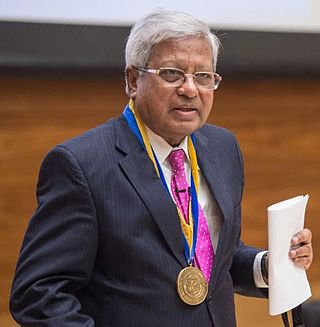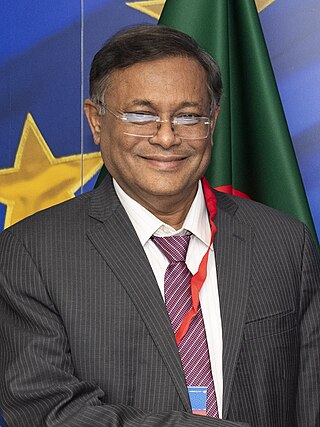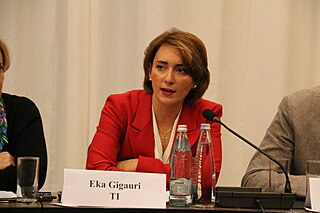
The European Investment Bank (EIB) is the European Union's investment bank and is owned by the 27 member states. It is the largest multilateral financial institution in the world. The EIB finances and invests both through equity and debt solutions companies and projects that achieve the policy aims of the European Union through loans, equity and guarantees.
Transparency International e.V. (TI) is a German registered association founded in 1993 by former employees of the World Bank. Based in Berlin, its nonprofit and non-governmental purpose is to take action to combat global corruption with civil societal anti-corruption measures and to prevent criminal activities arising from corruption. Its most notable publications include the Global Corruption Barometer and the Corruption Perceptions Index. Transparency International serves as an umbrella organization. From 1993 to today, its membership has grown from a few individuals to more than 100 national chapters, which engage in fighting perceived corruption in their home countries. TI is a member of G20 Think Tanks, UNESCO Consultative Status, United Nations Global Compact, Sustainable Development Solutions Network and shares the goals of peace, justice, strong institutions and partnerships of the United Nations Sustainable Development Group (UNSDG). TI is a social partner of Global Alliance in Management Education. TI confirmed the dis-accreditation of the national chapter of United States of America in 2017.

Peter Eigen is a lawyer, development economist and civil society leader.

Sir Fazle Hasan Abed 27 April 1936 – 20 December 2019) was the founder of BRAC, one of the world's largest non-governmental organizations.

Suresh Prabhakar Prabhu is an Indian politician and chancellor of Rishihood University. He has served as the Minister of Civil Aviation, Railways, Commerce & Industry in the First Modi ministry.

Elliot J. Schrage is an American lawyer and business executive. Until June 2018, he was vice president of global communications, marketing, and public policy at Facebook, where he directed the company's government affairs and public relations efforts. He then served as vice president of special projects at Facebook.

Kristalina Ivanova Georgieva-Kinova is a Bulgarian economist serving as the 12th managing director of the International Monetary Fund since 2019. She was the Chief Executive of the World Bank Group from 2017 to 2019 and served as Acting President of the World Bank Group from 1 February to 8 April 2019 following the resignation of Jim Yong Kim. She previously served as Vice-President of the European Commission under Jean-Claude Juncker from 2014 to 2016.

Corruption in Bangladesh has been a continuing problem. According to all major ranking institutions, Bangladesh routinely finds itself among the most corrupt countries in the world.

Corruption in Georgia had been an issue in the post-Soviet decades. Before the 2003 Rose Revolution, according to Foreign Policy, Georgia was among the most corrupt nations in Eurasia. The level of corruption abated dramatically, however, after the revolution. In 2010, Transparency International (TI) said that Georgia was "the best corruption-buster in the world." While low-level corruption had earlier been largely eliminated, Transparency International Georgia since 2020 has also documented dozens of cases of high-level corruption that remain to be prosecuted.

Muhammad Hasan Mahmud is a Bangladesh Awami League politician who is the incumbent Member of Parliament from Chittagong-7 constituency. In January 2019, he appointed as the Bangladesh Minister of Information. Currently he is the Minister of Foreign Affairs Bangladesh and a joint secretary of BAL.
Salahuddin Ahmed is a Bangladeshi economist, civil servant, and a former governor of the Bangladesh Bank, the country's central bank. He is a professor of BRAC University.

Eka Gigauri is a public figure and a civic activist who has served as the executive director of Transparency International Georgia, the national chapter of the global Transparency International anti-corruption movement, since December 21, 2010. In 2019 Eka Gigauri was elected as a board member of Transparency International Global movement and in 2021 she was reelected as a board member for a three-year term. In July 2022, Eka Gigauri was elected as a member of OGP Steering Committee for a three-year term.

Hetan Shah is the chief executive of the British Academy and the chair of Our World in Data. In 2024 he was appointed by the UK Parliament to the Board of the National Audit Office, the UK's spending watchdog. He is a visiting professor at King's College London and a Fellow of Birkbeck, University of London. He served as executive director of the Royal Statistical Society from 2011 to 2019.
Perween Hasan is a Bangladesh academic and rights activist. She is the chairperson of Transparency International Bangladesh. She is the Vice-Chancellor of the Central Women's University.
Ali Imam Majumder is a former Bangladeshi government official who was the Cabinet Secretary of Bangladesh. He is the Secretary General of Transparency International Bangladesh executive committee member of Citizens for Good Governance (SHUJAN).
Iftekharuzzaman is the executive director of Transparency International Bangladesh.
Tawfique Nawaz is a Bangladeshi lawyer and director of Transparency International Bangladesh. He is married to Dipu Moni, who is Bangladesh's Minister of Social Welfare and Former Minister of Education, Minister of Foreign Affairs. Nawaz is a senior advocate of the Bangladesh Supreme Court.
Parveen Mahmud is a Bangladeshi businesswoman and social worker. She is the chairperson of Underprivileged Children Education Program. She is a member of the governing body of the Palli Karma Sahayak Foundation. She is a trustee of Transparency International Bangladesh. She is an independent director of Marico Bangladesh.

12th National Parliament Election Process Tracking is a research report published by Transparency International Bangladesh (TIB) on the 2024 Bangladeshi general election, which faced opposition party boycotts. Presented at a press conference on 17 January, 2024, the report highlighted the election's one-sided nature and lack of competitiveness, neither free nor inclusive, posing a threat to the country's democracy. The Bangladesh Election Commission played a catalytic role in advancing the one-sided 'agenda,' with other state institutions, including law enforcement agencies and the administration, supporting the same 'agenda.' While independent candidates from the government party were assigned roles to foster competitiveness, most constituencies lacked true competition, with 241 out of 300 having no contests. A total of 41.8 percent polling, including 15.43 percent polling in the last hour of the election, sparked controversy. Despite technical success, the report suggests enduring questions about political integrity, democratic values, and ethical standards. The election failed to meet the prerequisites for fairness, participation, impartiality, and equal competition. The results indicate consolidated institutional dominance and a continued path of unchecked power and responsibility-free implementation in the political and governance system.











